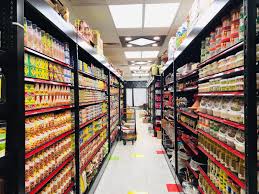Introduction: The Rise of Halal Markets in the U.S.
Over the past decade, the demand for halal products has grown rapidly in the United States. With an increasing Muslim population and greater awareness about halal standards, cities across the nation are seeing more businesses dedicated to serving these needs. One such example is the emergence of the halal supermarket Philadelphia, which not only caters to the local Muslim community but also attracts people from diverse backgrounds seeking quality, fresh, and ethically sourced products.
What Is a Halal Supermarket?
Before diving into the Philadelphia market, it’s important to understand what “halal” means. In Arabic, halal simply translates to “permissible” under Islamic law. A halal supermarket Philadelphia must ensure that all its meat and food items comply with halal standards, meaning animals are slaughtered according to specific guidelines, products are free from pork and alcohol, and overall cleanliness and ethical sourcing are emphasized. These stores often go beyond meat and include a wide selection of groceries, produce, baked goods, and even household items.
Why Philadelphia Is Becoming a Hub for Halal Shopping
Philadelphia is one of the oldest and most diverse cities in the U.S. It has long been a melting pot of cultures, religions, and traditions. The city is home to a large and vibrant Muslim population, many of whom reside in neighborhoods where halal products are in high demand. Because of this, the halal supermarket Philadelphia trend has grown significantly, with new stores opening to meet the needs of the community.
Another factor is the increasing popularity of halal food among non-Muslim residents. Many shoppers now choose halal products for their perceived higher quality, ethical treatment of animals, and assurance of cleanliness. This broader customer base has allowed halal supermarkets in Philadelphia to flourish.
Variety Beyond Meat Products
When people hear the term “halal,” they often think only of halal meat. While meat is a core part of the halal shopping experience, a halal supermarket Philadelphia offers much more. Shoppers can find a wide range of international spices, fresh fruits and vegetables, Middle Eastern sweets, South Asian rice varieties, and specialty beverages. Many stores also provide frozen meals and ready-to-cook items that make it easier for busy families to enjoy traditional dishes.
This variety is one of the reasons these supermarkets appeal to such a broad audience. For example, non-Muslim residents interested in exploring global cuisines often shop at a halal supermarket to find authentic ingredients that are hard to locate in standard grocery stores.
Supporting Local Communities
The presence of a halal supermarket Philadelphia goes beyond just retail. These businesses often play a crucial role in supporting the local community. Many are family-owned and hire local workers, contributing to the city’s economy. Additionally, halal supermarkets frequently support community events, sponsor cultural festivals, and provide charitable donations to those in need.
For many Muslim families, shopping at a halal supermarket is not just about buying groceries—it is also about connecting with their culture and religion. These stores create a welcoming environment where people can meet others from their community, exchange recipes, and maintain traditions.
The Economic Impact of halal supermarket philadelphia Supermarkets
The economic footprint of halal supermarkets in Philadelphia should not be underestimated. With rising consumer demand, these businesses have created new opportunities for local suppliers, distributors, and farmers who are certified to provide halal products. In addition, the success of the halal supermarket Philadelphia model has encouraged entrepreneurs to expand into related industries, such as halal restaurants, catering services, and even halal-certified cosmetic and wellness products.
Challenges and Opportunities
While the growth of halal supermarkets in Philadelphia is promising, it is not without challenges. One issue is ensuring consistent halal certification across all products. Consumers want reassurance that items meet strict halal guidelines, and supermarkets must work with credible certification bodies to maintain trust.
Another challenge lies in competition with mainstream grocery chains that have started adding halal sections. However, the halal supermarket Philadelphia often has an advantage because it offers authenticity, cultural familiarity, and a wider selection of specialized goods that large chains cannot easily replicate.
Looking ahead, there are numerous opportunities for growth. With the global halal market projected to continue expanding, Philadelphia’s supermarkets can position themselves as leaders by embracing innovation, offering online shopping, and delivering halal groceries directly to customers’ homes.
Why Everyone Should Explore a Halal Supermarket Philadelphia
Even if you are not Muslim, visiting a halal supermarket can be a rewarding experience. Not only do you gain access to fresh and diverse products, but you also get the chance to learn about other cultures and traditions. Trying new foods, discovering unique spices, and meeting people from different backgrounds can broaden your perspective and enhance your appreciation for Philadelphia’s cultural richness.
Conclusion: A Growing Part of Philadelphia’s Identity
The halal supermarket Philadelphia represents more than just a place to shop—it reflects the city’s diversity, inclusivity, and entrepreneurial spirit. As demand continues to grow, these supermarkets will likely expand their offerings, open new locations, and play an even greater role in the local economy and community life.
For anyone living in or visiting Philadelphia, stepping into a halal supermarket is not only a practical shopping choice but also a cultural journey that celebrates tradition, quality, and community.

